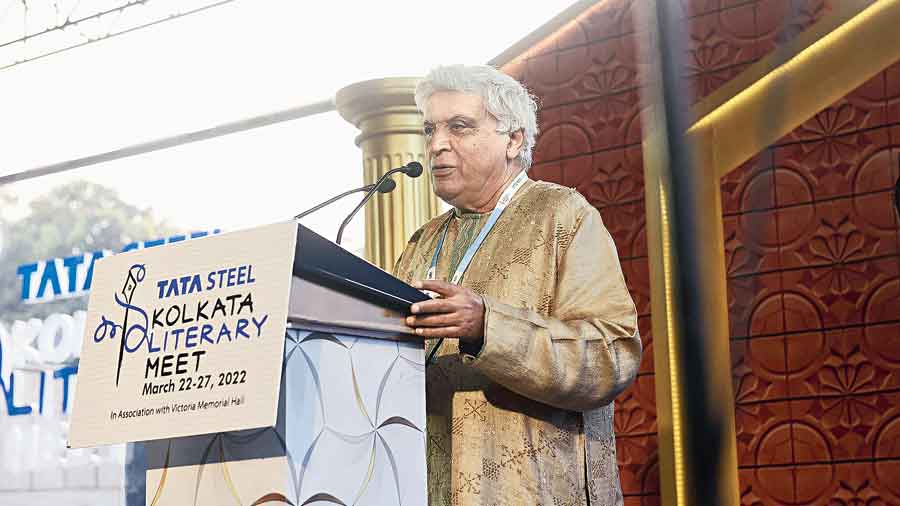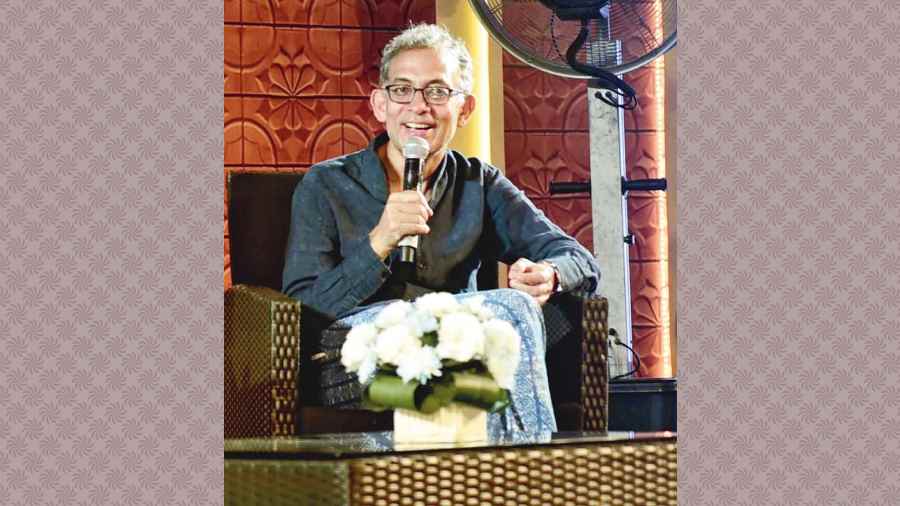The language of social justice has been reduced to a language of terrorists by some, Javed Akhtar, poet, lyricist, screenwriter and political activist, lamented on Tuesday.
“A few years ago, I read a newspaper report. (It said) two terrorists were caught in a car. Some illegal weapons, some RDX and two Urdu books were found in that car. Now, Urdu has become RDX. I was so hurt and disappointed,” Javed Akhtar said at the opening session of the Tata Steel Kolkata Literary Meet (Kalam), held in association with the Victoria Memorial Hall and The Telegraph.
The city’s annual date with the festival made a “physical” comeback after two years and the Victoria’s East Gate lawns were packed.
Akhtar underscored the irony in the way Urdu is treated in today’s India. “What a pity, because when they say ‘inquilab zindabad’ or even ‘Hindi Hindu Hindustan’, they are speaking pure Urdu,” he said at a panel discussion that included poet Srijato.
The session — titled Shaayri, Kobita — was moderated by Sangeeta Datta, writer, filmmaker and musician. It was on translations of Akhtar’s poems into Bengali by Srijato.
Speaking on the origins and evolution of Urdu, Akhtar stressed its non-conformist and egalitarian character.
“I am proud of one unusual fact about Urdu. All the poetry of any language starts from temples, churches, scriptures and praise to gods and religion. It then transcends towards other topics — first romance, then, much later, socio-politics etc. Urdu is an exception. When Urdu poetry started, it was agnostic, atheist, anti-fundamentalism and anti-superstition. All major poets — from Mir (Taqi Mir) to (Mirza) Ghalib, they are, if not atheist, at least agnostic. They are definitely irreligious and actually anti-religious people. This unique quality will not be found in any other language,” he said.
Akhtar spoke of the first conference of the Progressive Writers’ Movement in Lucknow, presided by Munshi Premchand and “blessed by none other than Rabindranath Tagore, who sent a long message”.
At the conference, the writers “took an oath that they would write for social and political change, against colonial powers and feudalism and for the rights of the downtrodden”.
“Great poets like Faiz (Ahmed Faiz), (Ali) Sardar Jafri and Kaifi (Azmi), they not only wrote but they were like activists. They were arrested and jailed. Krishan Chander, Ismat Chugtai or Saadat Hasan (Manto), these were the people who created literature which was so bold, unabashed and ahead of their times.
“Chugtai wrote a lot about women. In the 1940s, when Europe had not heard this word, lesbian, she wrote stories about lesbians and their problems and frustrations. She was dragged to court but she never apologised. These are the people who have made Urdu,” he said.
Datta asked for Akhtar's opinion on the trend to associate a language with a certain religion or community.
“This is the most stupid and illogical idea. Actually, we give language to religions. All the holy books were written in a language made by human beings," he said.
“They say Urdu is a language of Muslims. Nothing can be more absurd. Languages belong to regions, not religions. Ten crore Muslims told seven crore Muslims that we will not learn Urdu at the cost of Bengali. I love Urdu the way you love Bengali but I respect and salute those people who defended Bengali. For them, that was their mother tongue, which was far more important than their religion,” Akhtar said to huge applause from the audience.
At the inauguration, Akhtar spoke of his admiration for Bengali culture.
“I grew up in Lucknow. Urdu is my mother tongue. Bengali language, culture and aesthetics were deeply respected and admired in Lucknow, an extremely parochial place,” he said.

